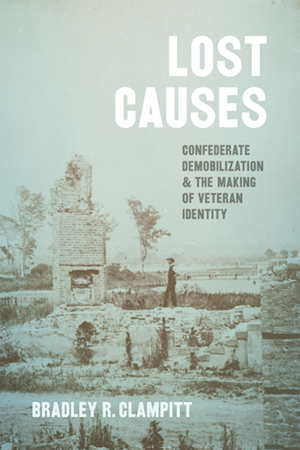
344 pages / 6.00 x 9.00 inches / no illustrations
History / Military / Veterans | History / United States - Civil War Period | History / United States - Southern History
This groundbreaking analysis of Confederate demobilization examines the state of mind of Confederate soldiers in the immediate aftermath of war. Having survived severe psychological as well as physical trauma, they now faced the unknown as they headed back home in defeat. Lost Causes analyzes the interlude between soldier and veteran, suggesting that defeat and demobilization actually reinforced Confederate identity as well as public memory of the war and southern resistance to African American civil rights.
Intense material shortages and images of the war’s devastation confronted the defeated soldiers-turned-veterans as they returned home to a revolutionized society. Their thoughts upon homecoming turned to immediate economic survival, a radically altered relationship with freedpeople, and life under Yankee rule—all against the backdrop of fearful uncertainty. Bradley R. Clampitt argues that the experiences of returning soldiers helped establish the ideological underpinnings of the Lost Cause and create an identity based upon shared suffering and sacrifice, a pervasive commitment to white supremacy, and an aversion to Federal rule and all things northern. As Lost Causes reveals, most Confederate veterans remained diehard Rebels despite demobilization and the demise of the Confederate States of America.
Bradley R. Clampitt is professor of history at East Central University in Ada, Oklahoma, and the author of Occupied Vicksburg and The Confederate Heartland: Military and Civilian Morale in the Western Confederacy.
“In taking up the provocative challenge of understanding Confederate veterans as they understood themselves, Bradley R. Clampitt explores the many-layered experiences that battle-hardened soldiers confronted as they transitioned to lives as private citizens. Lost Causes is as much about history as it is the historical process itself. Clampitt demonstrates how to balance personal accounts written during the turbulent events of 1865 alongside carefully crafted postwar reminiscences. At once a study of the ideology of defeat, the personal and institutional processes of demobilization, the complexities of white southern masculinity, and the origins of the Lost Cause, Clampitt’s new book contributes a novel addition to the vast literature on the ways that former Confederates dealt with profound loss and reconstructed their world.”—Andrew F. Lang, associate professor of history at Mississippi State University and author of In the Wake of War: Military Occupation, Emancipation, and Civil War America
“Popular accounts hold that bedraggled rebels returned to their homes in tatters, exhausted by the demands of war and devastated by the reality of defeat. Informed by deep and careful research in a trove of original sources, historian Bradley Clampitt usefully complicates this stubbornly enduring image, offering readers the richest, most stimulating analysis to date of Confederate demobilization. From the actual logistics of the journey home to the much-awaited homecoming moment, Clampitt supplies genuinely new insights into the minds and emotions of defeated rebels. Scholars and popular readers alike will welcome this lucid and perceptive account to a long-overdue but growing body of literature on Confederate veterans.”—Brian Matthew Jordan, author of the Pulitzer Prize finalist Marching Home: Union Veterans and Their Unending Civil War and coeditor of The War Went On: Reconsidering the Lives of Civil War Veterans
“While Lost Causes stands alone and will prove deeply informative to readers, it is in conversation with a host of recent studies on the war’s end and veterans’ experiences. Clampitt has written a commendable book that reveals how Confederate veterans from across the South responded to defeat, surrender, and readjustment. The layered experiences he artfully illuminates expose a critical period of personal transformation as the nation lurched toward a tumultuous reconstruction.”—Journal of Southern History
Found an Error? Tell us about it.